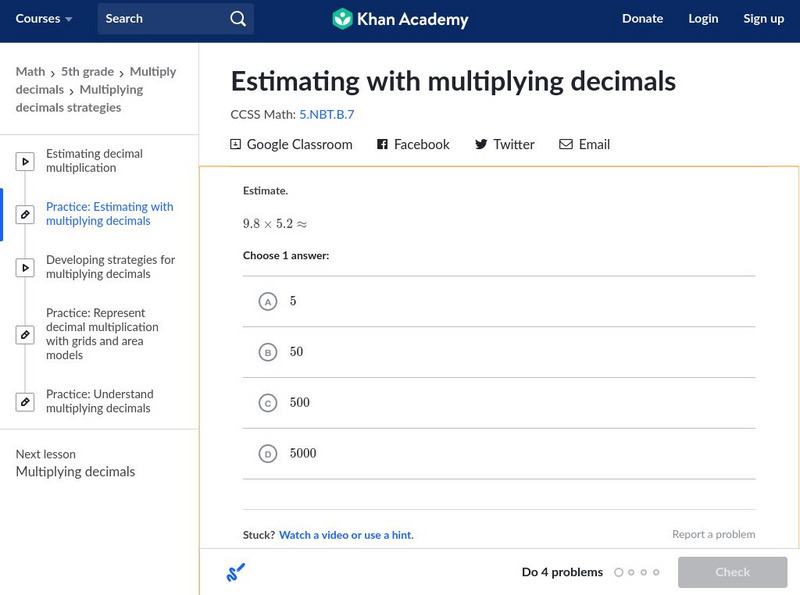Balanced Assessment
Fermi Area
Discover creative ways to use surface area formulas. In the assessment task, scholars apply estimation strategies to determine surface area in non-routine problems. They consider surface area of kitchen sponges, rock salt crystals, and...
Balanced Assessment
Fermi Length
How long does it take to get to the end of a toilet paper roll? Pupils use their estimation strategies to find lengths of common items. For example, knowing the area of a roll of toilet paper, scholars determine the length of the full roll.
Illustrative Mathematics
Reasoning about Multiplication and Division and Place Value, Part 1
Help your class make sense of quantities and their relationships. Given is the product of two numbers. It is up to your number crunchers to think about the quantitative relationship when the product is one-tenth or ten times the product...
Balanced Assessment
Fermi Number
A fermi number is a rough estimate of a quantity that is difficult or impossible to measure. Individuals design a process for making an estimation of a given scenario. For example, they determine a plan for estimating the number of...
Balanced Assessment
Catenary
Develop a model for a hanging chain. Pupils find a mathematical model for a hanging chain and then they compare their models to the precise function that models the curve. Scholars come up with a strategy to determine how close...
Fluence Learning
Solve Problems Using Measurement Concepts
Young mathematicians demonstrate what they know about measurement with a four-task assessment that focuses on estimation, length, and inches.
Illustrative Mathematics
Reasoning about Multiplication and Division and Place Value, Part 2
The learner puts reasoning and estimation to work. The directions are to place a decimal in the answer to make the equation true. Pupils are to look at the two problems, one multiplication and one division, and estimate an answer. No...
Noyce Foundation
Cat Food
Determine the right mix of cans of cat food. The resource consists of an assessment task to determine the cost to feed two cats for a specific number of days and requires scholars to interpret remainders within a context....
Concord Consortium
Full of Beans
Scholars have an opportunity to use their geometric modeling skills. Pupils determine a reasonable estimate of the number of string beans that would fill the average human body.
EngageNY
Grade 5 Math Module 1: End-of-Module Assessment
The last installment of the 18-part Grade 5 Math Module 1 is an end-of-module assessment. Scholars answer questions that require explaining the connection between powers of 10 and place value, rewriting decimals in different forms,...
EngageNY
Dividing Fractions and Mixed Numbers
Class members discover how to extend division to fractions to mixed numbers. Individuals first review how to convert mixed numbers to improper fractions and then apply division strategies learned in previous lessons. A memory game...
Illustrative Mathematics
Placing a Square Root on the Number Line
There are many ways to approach finding the rational approximation of an unknown square root. Here is a problem that will help math learners make a connection between square roots and their order on a number line. As usual, determine two...
Illustrative Mathematics
Equivalent fractions approach to non-repeating decimals
Trying to get your class to think of decimals as fractions and vice versa can lead to interesting discussions. After all, we can usually understand quickly that 1/4 is .25 but why is 1/7 not so easy to convert? This activity looks...
Mathematics Assessment Project
Middle School Mathematics Test 5
A middle school test contains two 40-minute sections covering material through algebra. All questions involve applied problem solving or mathematical analysis.
Achieve
Fences
Pupils design a fence for a backyard pool. Scholars develop a fence design based on given constraints, determine the amount of material they need, and calculate the cost of the project.
Achieve
Corn and Oats
How much land does a parcel hold? How much fertilizer does it take for a field of corn? Pupils answer these questions and more as they apply ratio reasoning and unit analysis.
Achieve
Yogurt Packaging
Food companies understand how to use math to their advantage. Learners explore the math related to the packaging and serving size of yogurt. They then use unit analysis and percent values to make decisions on the product development.
Noyce Foundation
Toy Trains
Scholars identify and continue the numerical pattern for the number of wheels on a train. Using the established pattern and its inverse, they determine whether a number of wheels is possible. Pupils finish...
Inside Mathematics
Graphs (2006)
When told to describe a line, do your pupils list its color, length, and which side is high or low? Use a worksheet that engages scholars to properly label line graphs. It then requests two applied reasoning answers.
Noyce Foundation
Ducklings
The class gets their mean and median all in a row with an assessment task that uses a population of ducklings to work with data displays and measures of central tendency. Pupils create a frequency chart and calculate the mean and median....
EngageNY
Dividing Multi-Digit Numbers Using the Algorithm
Scholars learn to divide multi-digit numbers using the standard algorithm in the 14th installment in a module of 21 parts. They get plenty of practice with the algorithm by completing a worksheet.
Khan Academy
Khan Academy: Estimating With Multiplying Decimals
Estimating with multiplying decimals. Students receive immediate feedback and have the opportunity to try questions repeatedly, watch a video or receive hints.





















